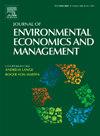道德产品市场
IF 5.9
3区 经济学
Q1 BUSINESS
Journal of Environmental Economics and Management
Pub Date : 2025-05-24
DOI:10.1016/j.jeem.2025.103182
引用次数: 0
摘要
本文研究了消费者和生产者如何在市场上对带有道德标签的商品(如“有机”或“无童工”)进行分类,同时考虑了外在和内在动机。我展示了亲社会动机和平衡排序之间的相互作用是如何产生“漂绿”的。积极的需求冲击导致更多的生产商采用这个标签,包括一些道德动机较弱的生产商。这降低了标签商品和未标签商品的预期环境和社会质量。对生产有道德标签的商品的最优补贴小于庇古补贴,在某些情况下,对这些商品征税甚至可能是最优的。本文章由计算机程序翻译,如有差异,请以英文原文为准。
The market for ethical goods
This paper studies how consumers and producers sort themselves in markets for ethically labeled goods, such as “organic” or “child-labor-free,” considering both extrinsic and intrinsic motives. I show how greenwashing arises from the interplay between prosocial motives and equilibrium sorting. A positive demand shock leads more producers to adopt the label, including some with weaker ethical motives. This lowers the expected environmental and social quality of labeled, but also unlabeled goods. The optimal subsidy for producing ethically labeled goods is smaller than the Pigouvian subsidy, and in some cases, it may even be optimal to tax these goods.
求助全文
通过发布文献求助,成功后即可免费获取论文全文。
去求助
来源期刊
CiteScore
8.00
自引率
4.30%
发文量
91
期刊介绍:
The Journal of Environmental Economics and Management publishes theoretical and empirical papers devoted to specific natural resources and environmental issues. For consideration, papers should (1) contain a substantial element embodying the linkage between economic systems and environmental and natural resources systems or (2) be of substantial importance in understanding the management and/or social control of the economy in its relations with the natural environment. Although the general orientation of the journal is toward economics, interdisciplinary papers by researchers in other fields of interest to resource and environmental economists will be welcomed.

 求助内容:
求助内容: 应助结果提醒方式:
应助结果提醒方式:


